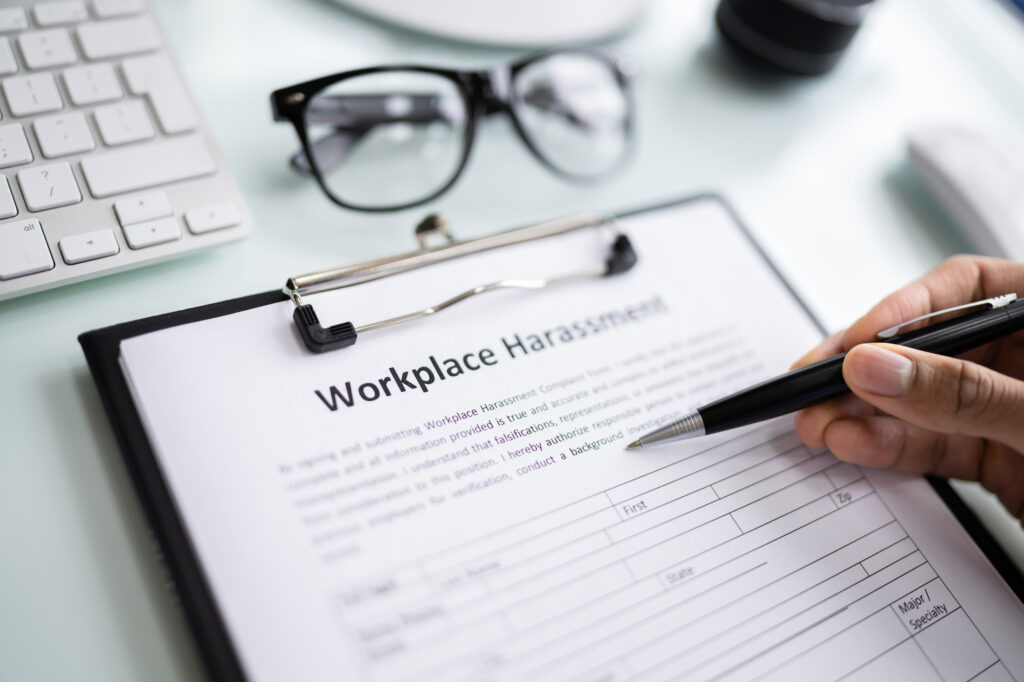Sexual harassment occurs when individuals have experienced unwanted sexual advances, comments, or behavior that create a hostile work environment. Sexual harassment is a form of sexual discrimination, which is protected by the Civil Rights Act of 1964. Employers must provide a workplace free from sexual harassment and sex discrimination. If your rights have been violated, you can bring a lawsuit against the employer or individual responsible for the harassment.
There can be a variety of sexual harassment incidents that need further investigation.

Specific legal criteria must be met to have a valid sexual harassment lawsuit, including the five elements below:
The plaintiff must show that the conduct or behavior was unwelcome and that they did not solicit or invite it.
The plaintiff must demonstrate that the conduct involved sexual advances, comments, or behavior.
The plaintiff must show that the conduct was severe enough to create an intimidating or abusive work environment or that the harassment was tied to job benefits or detriments.
The plaintiff must establish that the employer was aware of the harassment or should have been aware through reasonable measures and failed to take appropriate action to address or prevent the harassment.
The plaintiff must provide evidence of the harm or damages suffered, including the impact on their career, financial situation, and emotional well-being.
There are strict time limits for reporting and filing claims for sexual harassment and sexual discrimination. In Hawaii, it is typically 180 calendar days from when the discrimination occurred although there may be some exceptions.
In sexual harassment cases, clients may be eligible to recover multiple types of damages, including:
This includes lost wages due to harassment-related job loss, demotion, and lost future earnings, medical expenses including therapy or counseling due to emotional distress or psychological trauma, and job-related costs such as job search and relocation if the harassment forced a change in employment.
This includes compensation for the psychological impact of harassment, including anxiety, depression, loss of self-esteem, emotional pain and suffering, and loss of enjoyment of life.
If a case is particularly egregious or malicious, punitive damages may be awarded to punish the defendant and deter similar behavior. These damages are less common and require proof of intentional misconduct or gross negligence.
Compensation for the legal costs incurred by the plaintiff in pursuing the lawsuit may be awarded in sexual harassment cases.

A lawsuit cannot undo the emotional impacts you may suffer from sexual harassment. However, the legal process can help you retain or regain your career potential, bring justice to those guilty of sexual harassment, and ensure others do not suffer in similar ways. After an initial consultation, our experienced team will provide an honest assessment of whether your case has merit. If we can help, we assess all the evidence so you can receive fair compensation.
Find quick answers to common questions about preparing for a sexual harassment consultation.
Sexual harassment claims must be filed within a specific time frame following the harassment, which varies by jurisdiction. In Hawaii, this is typically 180 days.
Unfortunately, this is very common. Sexual harassment cases are complicated, private, and often embarrassing. Many people are not comfortable talking about these issues and maybe afraid for their jobs. If applicable, we can work with you to collect more witnesses and statements from other victims.
We will collect as many witness statements as possible to corroborate your case. The effectiveness of employer policies can impact the case, particularly in terms of the employer’s responsibility and response to the harassment.
Anyone, regardless of gender or sexual orientation, can be a victim of sexual harassment. It can occur between coworkers, between a supervisor and subordinate, or even from a non-employee, like a client or customer.
Document the harassment, including a detailed record of incidents with dates, times, locations, and witnesses. Report the behavior to your supervisor, HR department, or follow the company’s reporting procedures and then seek legal advice from an experienced lawyer to understand your rights and options.
It is illegal for employers to retaliate against employees for reporting sexual harassment. Retaliation can include firing, demotion, reduced hours, or creating a hostile work environment. If you experience retaliation, you may have grounds for an additional legal claim.